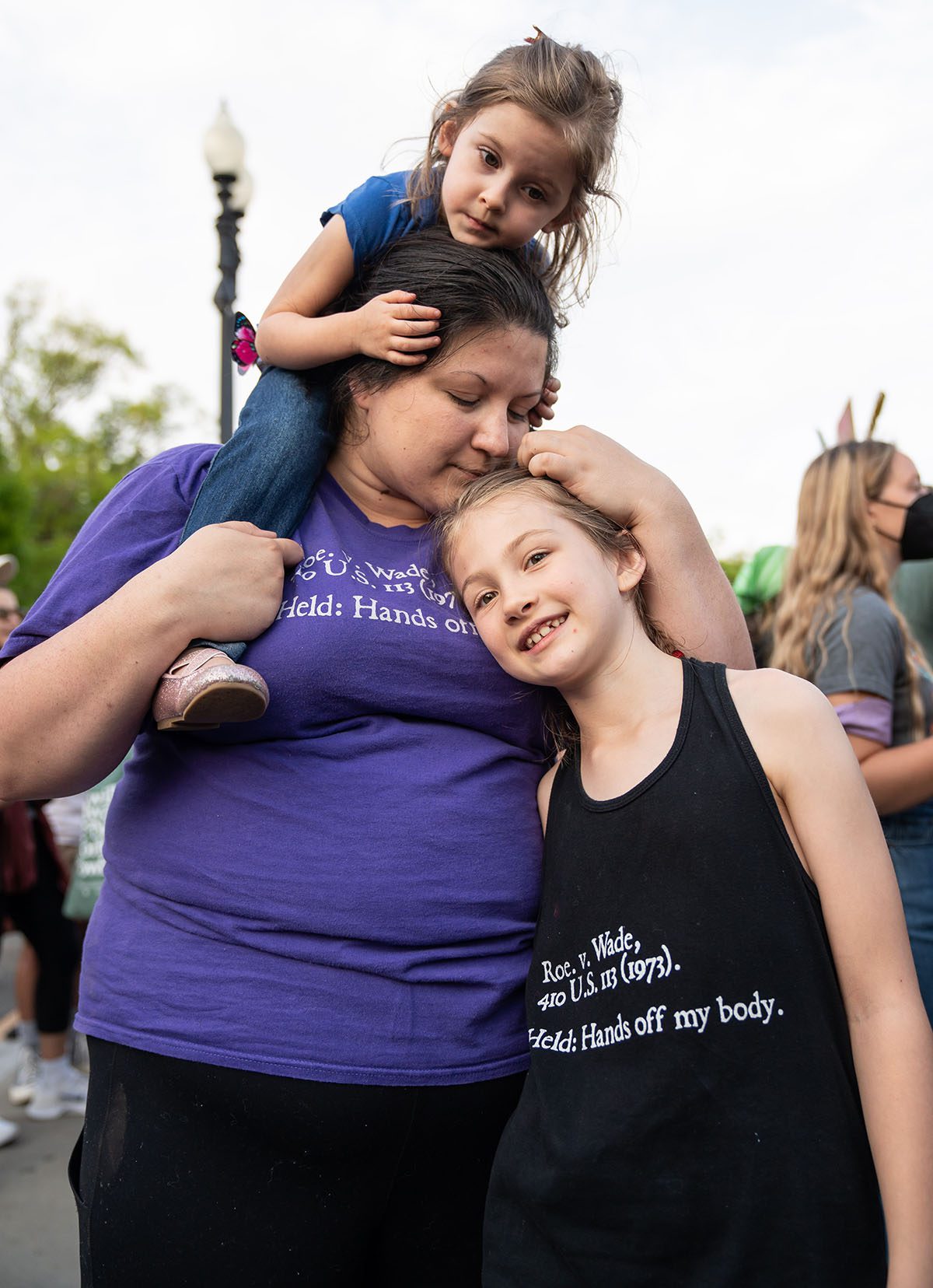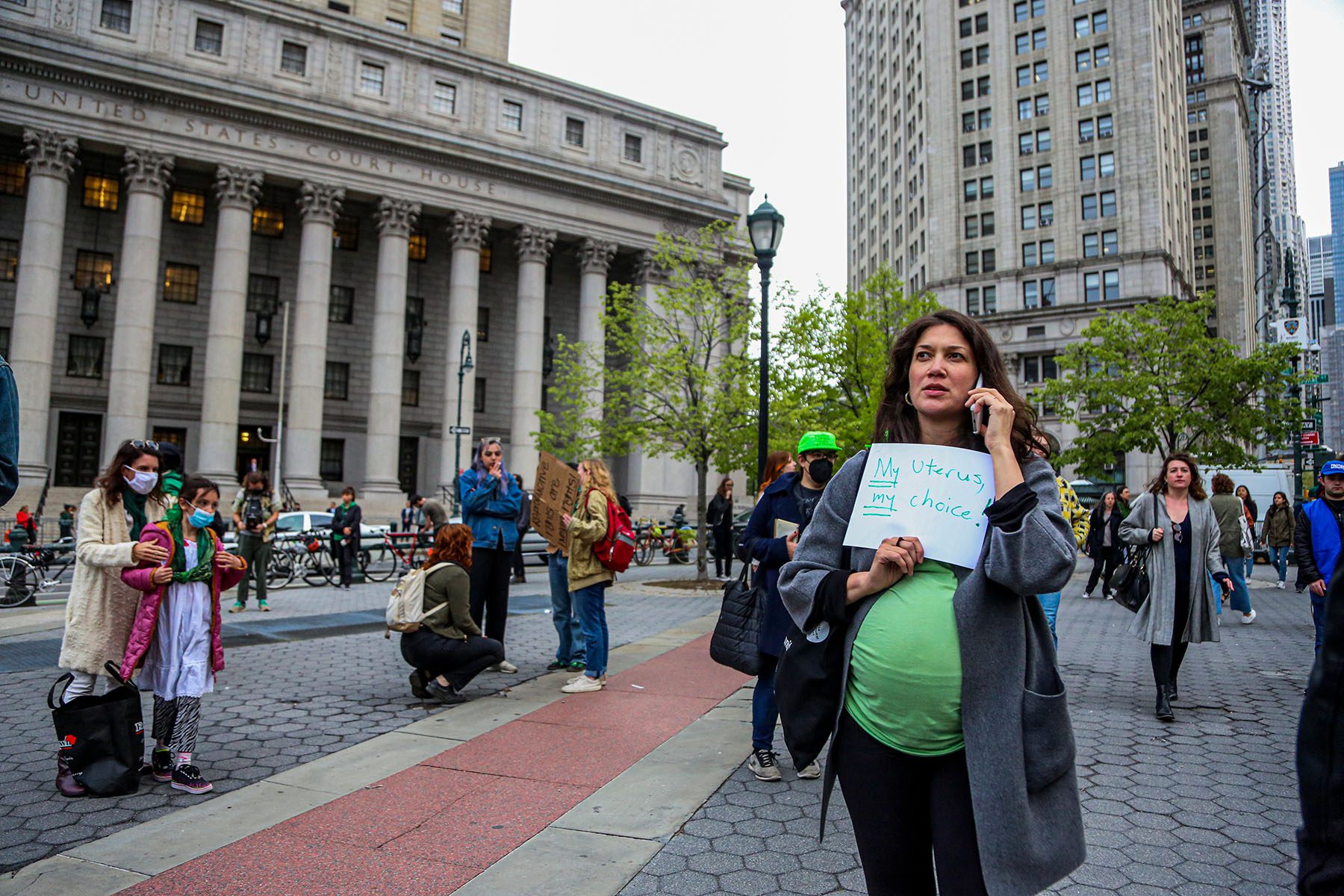Belinda Jordan’s mom gave birth to her at 16. She’s happy her mom chose to continue her pregnancy, but she’s also glad she had a choice. Now she worries about what happens to the ability to make such decisions. Jordan now lives in Broken Arrow, Oklahoma, where the governor just signed into law a ban on all abortion after six weeks gestational age.
If the Supreme Court overturns Roe v. Wade, which for almost 50 years has legalized abortion, nearly all abortions would swiftly become illegal in her state. Jordan worries for herself and for her 4-year-old daughter’s future.
“[My mom] chose to have me, and I’m glad she did,” Jordan, 42, said. “But I don’t believe that’s the right choice for every single family. I have a lot of sadness right now.”
In the wake of the leak of the draft opinion by Supreme Court Justice Samuel Alito that would overturn Roe v. Wade, The 19th reached out to dozens of parents across the country. While about 20 percent of Americans believe abortion should always be illegal, the ones we spoke to were concerned about what the end of a constitutional right to abortion would mean — including those who considered themselves largely apolitical, those who had grown up in religious households, and those who are deeply religious now.
If Roe is overturned, the decision on the legality of abortion would then go to the states, leaving it to lawmakers in each state to determine abortion’s legality and on what terms. Some of the women who spoke to The 19th live in states with “trigger laws” that would quickly outlaw almost all abortions if Roe was overturned, while others are in states that have protected that right. Many expressed concern about their children’s future and safety, wondered about how they would one day explain the implications of this ruling, and talked about how the reality of pregnancy and birthing complications impacted their feelings.
As soon as Lane Bernes Genee, the 39-year-old mom of a 2-year-old and a 6-year-old living in Brooklyn, heard the news, she started thinking about where her daughter might go to college.
-
More abortion coverage from The 19th
- Anti-abortion groups applaud leaked Supreme Court decision, but prep for more work to be done
- Abortion providers expected that Roe v. Wade could be overturned. But the leaked draft made it real.
- What happens if Roe v. Wade is overturned? LGBTQ+ legal experts are worried about civil rights.
“I know this sounds crazy, because she’s 6, but my first thought was, ‘Oh my God — what if she goes to college in Indiana like I did and she has no access to health care and she gets pregnant and she can’t access abortion,” Genee told The 19th. “I have all of these scenarios that keep playing out in my head and I realize they may be nonexistent, but they’re just so nagging on my mind.”
When Genee had an abortion in college, she initially didn’t tell her mother. Years later she finally did, but, she said, abortion was still “something whispered” in her family. As a mother herself now, she wants to do things differently.
“I want to say to my kids, ‘Here’s how babies are made, here’s how to use condoms, here’s how to use birth control, here’s what Plan B is for and here’s what abortion is if you need it.’ I think having it in the same conversation as contraception makes it just a normal part of life,” she said.
Many parents brought up concerns over the ability to access high-quality, evidence-based sex education in schools.
In Miami, Grace Gomez, 29, is the mom of 1.5 year old twins, a boy and a girl. The child of immigrants from Nicaragua, Gomez said she was taught that America “was supposed to be better than where we came from.” The news about Roe, though, “feels like a slap in the face.”
Gomez has already emphasized using proper names for body parts, including genitals, but thinks she may need to talk to them about abortion earlier than she was planning.
“I want [my kids] to be as educated as possible,” Gomez said.
Mori Bell, 42, of San Diego, was raised in a deeply religious, evangelical Christian household. “My former self would have been elated” about hearing about the fall of Roe, Bell said.
But when she became a mother 11 years ago, she suddenly stopped going to church. “Having a child was the catalyst that changed me,” Bell said. “My former self felt there was no hope for our world because abortion was an option for people, that it was a horrible, sinful thing for all humanity.”
Today, though, she feels differently, and she’s figuring out how to talk about the decision with her son.
“I said to him that this really big thing is happening that is about seeing women as equals,” she said.
Monica Caron, 38, said that as soon as she heard the news Monday night, she asked her husband if they would stay in Georgia.
Caron said that though she values her role as a voter in a purple state, she’s not sure she could stay in a state where abortion could soon become illegal. In Georgia, a law banning abortion after six weeks of gestational age that has been blocked by courts would go into effect. She’s concerned about her two daughters.
“I want to give my girls the opportunity to be fully educated about their bodies. I want them to have all the options,” Caron said. “I don’t want them to be shamed. This changes everything.”
Caron says she also is incredibly worried about the implication for the remaining frozen embryos she has as a result of her and her husband’s efforts to conceive their second child through In Vitro Fertilization (IVF). In IVF, generally multiple embryos are created but only one or two are transferred into a person’s uterus at a time. Experts worry that laws in some states, which define life beginning at the moment of conception, could make this process illegal.

“What if they introduce a personhood aspect onto some new abortion law in Georgia as a result of this?” Caron said. “What’s going to happen to those embryos?”
Jordan of Oklahoma is also worried about what happens to those who go through IVF, as she did.
“When you start telling women what they can and cannot do in one reproductive health matter, it’s only a matter of time before someone makes a law that says IVF is not legal and that some people are not allowed to have families,” Jordan said.
In Orlando, Florida, Kaley McBratney, 30, was reading Reddit when she saw a post asking if anyone was organizing a protest. That’s when she learned about the Dobbs opinion leak, and “immediately started crying.”
Florida Gov. Ron DeSantis recently signed a bill banning abortion after 15 weeks gestational age; the new law takes effect on July 1, with no exceptions for rape, incest or trafficking. It is unclear what further actions to ban abortion further the state might make, especially if Roe is overturned by the Dobbs ruling.
“I’ve never talked to someone about my political views before, but my daughter is an unheard voice at this time so I feel like I have to stand up for her,” McBratney said. She said she wants to become “more proactive,” both in voting and in finding other ways to express her opinion, including protesting.
Los Angeles-based Melanie Freeland, 45, said though she was traveling when the news first broke about the leaked Roe opinion, she wondered how to tell her 10-year-old son about news she knew he would hear about at school. When Freeland was growing up, her mother was vocally anti-abortion, but she began to reconsider that after Freeland had an ectopic pregnancy.
An ectopic pregnancy is a life-threatening condition in which a fertilized egg implants outside the uterus. Many Republican lawmakers have said abortion bans will not apply to ectopic pregnancies, but some language leaves that unclear.
Freeland’s eventual pregnancy with her own son was “very difficult,” something else that opened her mother’s eyes “to the things that can happen to a woman when she’s pregnant.” As a result, Freeland said, her mom is “more pro-choice.”
Martha Arendt, 41, is the mother of a 5-year-old and a 3-year-old in the Chicago area. A major health event in her own life “made clear to me how important it is to have access to great, high-quality health care,” she said. “I believe everybody should have access to that same health care. As a mom, it is deeply frustrating and troubling to see moments like this that make it harder for anyone to get the care they need, especially women and especially individuals who already have so many other challenges ahead of them.”
Arendt also acknowledged that she lives in “a blue house in a blue Zip code in a blue state,” one that has codified Roe, guaranteeing access to abortion. “We benefit from so many systemic privileges that make things easier for us,” Arendt said. “For me, this issue doesn’t feel political: It’s about access to care and autonomy for making health care decisions. … We don’t need more barriers, we need more access to care.”
And for some mothers, the looming Supreme Court decision may have changed their own parenting journeys. Ashley spoke on condition her last name not be used because her family is in a religious leadership role in their community. She has two children and always dreamed of having three, but she had an abortion in August 2021 after learning when she was 11.5 weeks pregnant that the fetus had a chromosomal abnormality.
“I was lucky to have a safe abortion in a hospital, but it really threw my mental health for a loop. I felt a loss. It made me unsure if I wanted to try again for a third child,” she said. Since her abortion, she said, she’s been “struggling with mental health and going to counseling and grieving.” She and her husband had just decided to once again try to get pregnant when they heard Monday night’s news. She lives in a state where most abortions are likely to become illegal.
“I feel like the choice is not in my court anymore. I feel like the state has made this decision for me,” Ashley said. “I’m scared to try again because [now] I don’t feel like I [will] have the autonomy to deal with what might come up.” She’s worried about what another pregnancy attempt might mean for her health.
She added: “It feels like the state decided for me that I don’t get to have a third child.”







